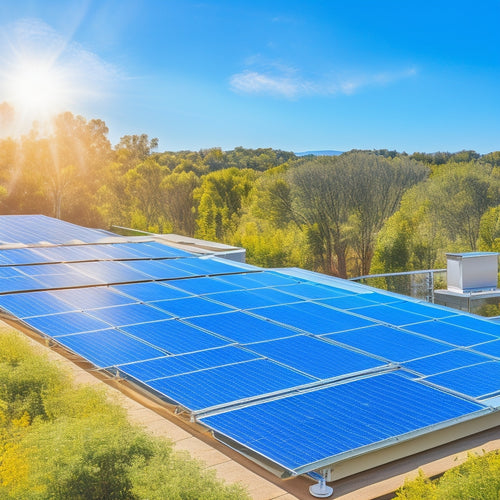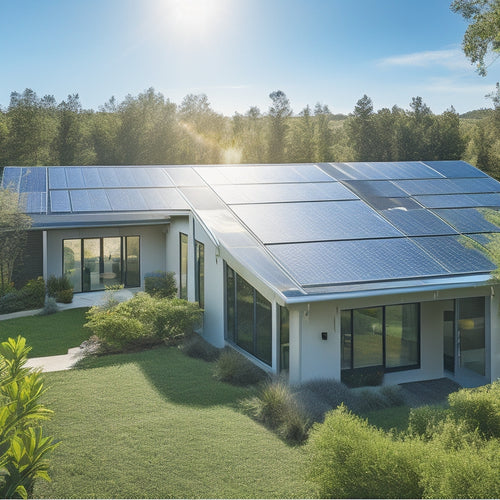
Off Grid Battery Storage
Share
You're considering off-grid battery storage to gain energy independence and reduce your carbon footprint. With reliable power during outages, backup energy solutions keep critical appliances operational, guaranteeing connectivity and productivity. Off-grid battery storage aligns with eco-friendly values, reducing reliance on fossil fuels and minimizing carbon footprint. When selecting a system, consider factors like depth of discharge, cycle life, and maintenance to guarantee peak performance. As you investigate your options, you'll find that balancing energy needs with battery health is critical for cost efficiency, and that's just the beginning of what you'll need to know to make an informed decision.
The Essentials
- Off-grid battery storage provides reliable power during outages, ensuring energy independence and connectivity in disaster-prone areas.
- Renewable energy systems with battery storage reduce carbon footprint, promoting eco-friendly values and sustainability.
- Depth of discharge, cycle life, and energy storage capacity are crucial technical considerations for optimal off-grid battery performance.
- Balancing energy needs with battery health is critical for cost efficiency, as cycle life and depth of discharge impact overall system costs.
- Advanced battery technologies, such as lithium-ion, offer improved efficiency, scalability, and recyclability, future-proofing off-grid energy systems.
Reliable Power During Outages
You need power when you need it, and that's exactly what off-grid battery storage provides.
During an outage, you can rely on backup energy solutions to keep your critical loads running, ensuring that your home appliances and essential devices remain operational.
With a reliable power system, you'll have the energy you need to stay connected and productive, even when the grid is down.
Power When You Need
During extended grid outages, a reliable off-grid battery storage system becomes the backbone of your energy infrastructure, providing power when you need it most. You gain energy independence, ensuring your home or business remains operational and comfortable. This sustainable living solution is especially essential for those living in areas prone to natural disasters or frequent power outages.
| Feature | Benefit |
|---|---|
| Solar Integration | Utilize renewable energy from the sun to recharge your batteries |
| Portable Solutions | Take your energy storage system with you, perfect for remote or temporary setups |
| Smart Technology | Monitor and control your energy usage remotely, optimizing your system's performance |
When choosing an off-grid battery storage system, consider factors like system compatibility, maintenance tips, and budget considerations. Be aware of installation challenges, such as ensuring proper ventilation and electrical connections. By selecting a reliable system, you'll enjoy uninterrupted power when you need it most, giving you the freedom to live life on your own terms.
Backup Energy Solutions
A reliable backup energy solution is the cornerstone of any off-grid battery storage system, providing a safety net against prolonged power outages. You need a system that can seamlessly integrate with your solar integration, guaranteeing a continuous flow of power when the grid goes down.
Smart management systems allow you to monitor and control your energy usage, optimizing energy efficiency and cost savings. By integrating a battery storage system into your solar setup, you can store excess energy generated by your panels during the day to use at night or during power outages, and gain protection from grid outages and fluctuations.
With grid independence, you're no longer reliant on the grid, giving you the freedom to live life on your terms. As technology advancements continue to improve, you can scale your system to meet your growing energy needs. Renewable sources, such as solar and wind, provide a clean and sustainable energy solution.
When selecting a backup system, consider the maintenance requirements and installation options to guarantee a hassle-free experience.
User education is key to getting the most out of your backup energy solution. By understanding how your system works, you can optimize its performance and enjoy the benefits of off-grid living.
With the right backup energy solution, you can rest assured that you'll have reliable power during outages, giving you the freedom to live life off the grid.
Reduced Carbon Footprint Guaranteed
You're likely looking for an off-grid battery storage solution that not only provides reliable power during outages but also aligns with your eco-friendly values.
By choosing a battery storage system, you're opting for an eco-friendly energy solution that greatly reduces your reliance on fossil fuels.
With renewable energy systems like solar power storage, you can enjoy a consistent power supply while minimizing your carbon footprint.
This means you'll be producing lower emissions today, making a positive impact on the environment for future generations.
Eco-Friendly Energy Solutions
Sustainability converges with innovation in off-grid battery storage, clearing the path for eco-friendly energy solutions that guarantee a reduced carbon footprint. As you initiate this expedition, you'll uncover a domain of possibilities that align with your values of energy independence and sustainable practices. Renewable innovations, such as solar integration, enable you to utilize the power of nature while minimizing your environmental impact.
| Eco-Friendly Solutions | Benefits | Applications |
|---|---|---|
| Solar Integration | Reduced carbon footprint, energy independence | Residential, commercial, community initiatives |
| Battery Recycling | Closed-loop system, reduced waste, financial incentives | Industrial, commercial, community initiatives |
| Grid Alternatives | Energy management, reduced reliance on grid | Residential, commercial, industrial |
Lower Emissions Today
As the world shifts towards eco-friendly energy solutions, embracing off-grid battery storage becomes vital for reducing carbon emissions.
You're taking an important step towards a sustainable future by adopting renewable energy sources and minimizing your reliance on the grid. By integrating off-grid battery storage into your energy system, you'll greatly decrease your carbon footprint.
You'll be able to capture the power of solar, wind, or hydro energy and store excess energy for later use.
This approach guarantees that you're utilizing clean energy whenever possible, reducing your dependence on fossil fuels. As a result, you'll lower your emissions and contribute to a healthier environment.
Depth of Discharge Matters
When you're designing an off-grid battery storage system, you'll need to take into account the depth of discharge (DOD) of your batteries, as it greatly impacts their cycle life and energy storage capacity.
A deeper DOD means more energy is withdrawn from the battery, which can reduce its overall lifespan. For instance, using solar battery storage systems can help mitigate this issue.
Additionally, deep cycle batteries, commonly used in off-grid energy storage, are designed to handle deeper DODs without compromising their lifespan.
Cycle Life Impact
Your off-grid battery storage system's lifespan hinges on its cycle life, which is greatly impacted by the depth of discharge (DOD). The DOD refers to how much of the battery's capacity is used before recharging. A deeper DOD means more energy is extracted, but this reduces the battery's overall lifespan. You need to balance your energy needs with the impact on your battery's cycle life.
Different battery chemistries have varying tolerance for DOD. For instance, lithium-ion batteries can handle deeper DODs than lead-acid batteries. Proper maintenance practices, such as monitoring temperature and charging efficiency, also play an essential role in extending cycle life.
Additionally, thermal management and lifespan optimization techniques can help minimize the environmental impact of your storage solutions. By understanding your usage patterns and optimizing your charging habits, you can maximize your battery's performance longevity.
Energy Storage Capacity
To guarantee your off-grid battery storage system meets your energy needs, you must consider its energy storage capacity, which is closely tied to the depth of discharge (DOD). A higher energy storage capacity allows you to store more energy, but it also increases the system's cost and complexity.
You need to strike a balance between energy density and storage longevity to optimize efficiency. Capacity planning is essential to confirm your system can meet your energy demands during periods of low energy production.
Technology advancements have improved battery efficiency, allowing for more efficient energy storage and retrieval. When integrating your battery storage system, consider scalability options to future-proof your setup.
Maintenance requirements, such as monitoring performance metrics, are vital to prolong the lifespan of your batteries. By understanding your usage scenarios and optimizing your system's capacity, you can maximize your energy independence.
Effective capacity planning also enables you to take advantage of integration strategies that optimize energy production and storage. By getting it right, you'll enjoy a reliable and efficient off-grid battery storage system that meets your energy needs.
Cycle Life Affects Cost
When selecting an off-grid battery storage system, you must consider the cycle life of the batteries, as it directly impacts their overall cost.
For instance, lithium-ion batteries, like the Tesla Powerwall, are known for their long cycle life, making them a reliable option for renewable energy systems.
Deep Cycle batteries, in particular, are designed to handle deep discharging, which can affect their lifespan.
The cycle count, which is the number of charge and discharge cycles a battery can handle before its capacity degrades, affects the battery's lifespan and, consequently, its cost per kilowatt-hour.
Depth of Discharge Matters
Depth of discharge considerably impacts the overall cost of off-grid battery storage systems. When you're designing your system, you need to take into account how deeply you'll be discharging your batteries on a daily basis. This is because discharge efficiency varies greatly depending on the battery chemistry you've chosen.
For example, lithium-ion batteries can handle deeper discharges than lead-acid batteries, but even they've their limits. If you're consistently discharging your batteries to 80% or more, you'll reduce their overall lifespan. This means you'll need to replace them more frequently, which can be costly.
On the other hand, if you only discharge them to 50%, you'll get more cycles out of them, reducing your long-term costs. It's crucial to strike a balance between meeting your energy needs and preserving the health of your batteries.
Cycle Count Impacts Cost
As you deliberate on the ideal battery configuration for your off-grid system, understanding the impact of cycle count on cost becomes paramount. The number of charge and discharge cycles a battery can handle directly affects its overall cost efficiency.
Different battery chemistries have varying cycle life expectations, with some lasting up to 5,000 cycles and others only 1,000. This variance considerably impacts maintenance requirements and performance metrics over the battery's lifespan.
When selecting a battery, consider the installation challenges and user experience. A battery with a longer cycle life may require less frequent replacements, reducing labor costs and minimizing downtime.
On the other hand, batteries with shorter cycle lives may be more affordable upfront but necessitate more frequent replacements, increasing overall costs. As you weigh these factors, keep in mind market trends moving towards sustainable solutions, including recycling options for spent batteries.
Longer Shelf Life Guaranteed
You'll find that off-grid battery storage solutions with longer shelf life guarantees often rely on advanced material technology.
This involves the use of specialized components and manufacturing processes that minimize degradation over time.
Advanced Material Technology
High-performance battery storage relies on advanced material technology to guarantee a longer shelf life assured.
You're probably aware that traditional lithium-ion batteries have limitations, such as energy density and thermal management issues. That's why researchers have been working on innovative solutions.
Nanotechnology advancements have led to the development of solid-state batteries, which replace the liquid electrolyte with a solid material, enhancing safety features and performance optimization.
Graphene applications have also shown promise, offering improved energy density and power density. Furthermore, lithium alternatives like sodium-ion and zinc-air batteries are being investigated.
These advancements enable the creation of composite materials that can be recycled using advanced recycling technologies. In addition, you can expect to see improved thermal management systems, which will reduce heat generation and increase overall efficiency.
With these breakthroughs, you can enjoy a longer shelf life for your off-grid battery storage, ensuring you have the freedom to live life on your own terms.
Frequently Asked Questions
Can I Use Off-Grid Battery Storage With Existing Solar Panels?
You can connect off-grid battery storage to your existing solar panels, but you'll need to ascertain solar panel compatibility and consider battery capacity to optimize energy harvesting and storage for your independent energy needs.
How Often Should I Inspect and Maintain My Battery System?
Just like a car needs regular oil changes to run smoothly, your battery system requires frequent inspections to enhance its lifespan. You should check your batteries every 3-6 months, following maintenance tips like cleaning terminals and monitoring water levels to guarantee peak performance and extend its life.
Are Off-Grid Battery Storage Systems Compatible With Generators?
When you're considering backup power, you'll find that most generators are compatible with your system, but you'll need to guarantee it's optimized for generator compatibility to maximize system efficiency, allowing you to utilize the power you need when you need it.
Can I Add More Batteries to My System in the Future?
Feeling stuck with your current setup? Don't worry, you're not locked in! You can breathe easy, knowing you can scale up your battery capacity in the future, allowing for seamless future expansion when your energy needs grow.
Do Off-Grid Battery Storage Systems Require Special Installation Skills?
When installing a battery storage system, you'll need to ascertain you meet specific installation requirements to guarantee battery safety; this typically demands specialized knowledge, so it's essential you hire a qualified professional or develop the necessary proficiency yourself.
Final Thoughts
As you venture off the grid, a dependable battery storage system becomes your trusted ally, shielding you from the uncertainty of power outages. By utilizing renewable energy, you'll reduce your carbon footprint, guaranteeing a clearer conscience and a healthier planet. Look for depth of discharge and cycle life guarantees to confirm your system's longevity, translating to cost savings and peace of mind. With a longer shelf life, your investment will remain sturdy, a guiding light of sustainability in an unpredictable world.
Related Posts
-

What Types of Solar Energy Devices Are Available
You'll find several types of solar energy devices available today, each customized to different energy needs. Photovo...
-

Replacing Old Appliances With Sustainable Alternatives
Replacing old appliances with sustainable alternatives can change your home into an energy-efficient space. Not only ...
-

Installing Metal Solar Roofs for Maximum Energy Efficiency
Installing metal solar roofs can drastically enhance your home's energy efficiency and durability. These roofs withst...


